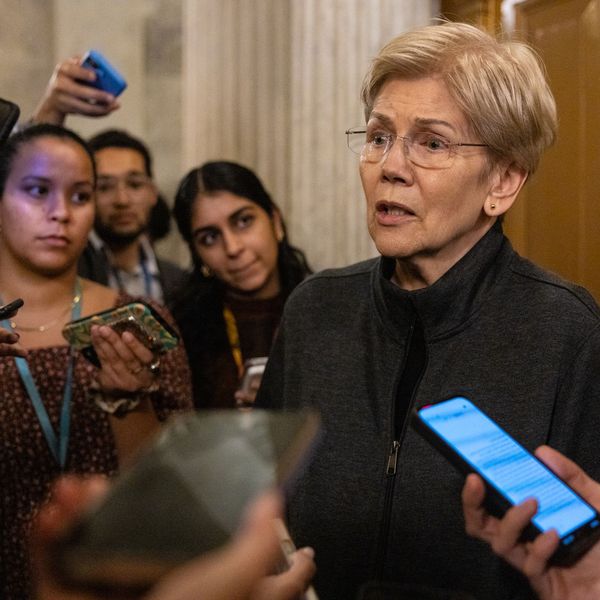But What About My 401(k)?
Credit cards, mortgages, insurance, retirement: How to fulfill our basic financial needs without Wall Street.
The first reaction of most people to the call to shut down Wall Street is one of jubilant enthusiasm. The second reaction is, "But what about my 401(k) retirement account?" The same question might be raised about our credit cards, mortgages, and medical, homeowners, and auto insurance.
Money may be nothing but a number, but survival in a modern society is impossible without basic financial services. There are, however, better ways to deal with our very real financial needs than those presently offered by Wall Street. Here are some examples.
Credit Cards. Credit cards have two distinct functions: a convenient means of clearing transactions and an open line of credit. The first is a straightforward and beneficial service if properly regulated and transparent. The second is an enticement to debt slavery and predatory lending.
The solution to wages inadequate to provide for daily needs is not easier, cheaper, or fairer credit; it is to restore living-wage jobs, to tax the rich to provide a floor of essential public services, and to reduce household expenses by restoringthe household as a center of production. Financing for large, durable purchases like a home, car, or major appliance can be arranged on a case-by-case basis with a local bank, savings and loan, credit union, or even the local merchant from which the purchase is made.
Home Mortgages. The purpose of a mortgage is to finance homeownership, not to fuel speculation, create a foundation for loan pyramids, inflate a housing bubble, or substitute for a paying job. We best advance the goal of broad participation in responsible homeownership by measures that increase job security, raise wages, maintain stable housing prices, and restore a system of member-owned mutual savings and loan institutions like we once had that extend and hold mortgages for local home buyers under a system of state and federal supervision.
Insurance. Insurance involves a pooling of risk by which a group of individuals guarantee one another against individual ruin from a catastrophic illness, disability, fire, flood, or other random unavoidable event. Private, for-profit insurance companies are an inherently problematic instrument for pooling risk, because they create an inevitable conflict of interest between the insured and those who agree to bear their risk for a profit.
The more appropriate mechanisms are nonprofit, member-owned mutual insurance associations and federal programs like Social Security or Medicare, in which there is a strong commonality of interest. Public programs have the added advantage of assuring universal coverage, spreading the risks over a large number of people, and minimizing the costs of recruitment and administration.
Retirement. The idea that a generation of workers can secure its retirement by storing numbers in an individual retirement account on the computer hard drive of a Wall Street financial institution is a cruel illusion. Retirees cannot eat financial bubbles. Numbers stored on a computer drive will not nourish them even if the institution remains solvent. They need real food, shelter, medical care, clothing, recreation, and other goods and services--all of which must be produced and provided by working people at the time the retirees' needs are presented. Furthermore, it is impossible to know in advance how long an individual will live or what his or her health needs will be. It is therefore impossible to determine the individual savings required to be secure.
For a society, retirement is inherently an intergenerational contract between retirees and working adults--much like the U.S. Social Security program, in which working people agree to commit a portion of their labor to providing for the elder care needs of those who nurtured them during their childhood. They expect the next generation of youth will likewise care for them in turn.
The threat facing future retirees is not insufficient money--which government can easily create with an accounting entry--it's demographics. In 1960, there were five working people per retiree. Because of longer life spans and the greater percentage of people reaching retirement age, that ratio was 3.3 to 1 in 2004. Unless the retirement age changes dramatically, it will be down to 2 to 1 by 2040.
Those of working age best secure their elder years by investing in the productivity of those who will follow them--by investing in the education, technology, and infrastructure required for the next generation of workers to provide for their own future nutrition, shelter, health care, and other essentials, while doing the same for those who can no longer provide for themselves.
Wall Street financial scams and phantom wealth financial assets will not feed us or provide us with essential shelter and health care. We had a system of institutions that effectively met our need for the basic financial services required by a real wealth economy--until Wall Street dismantled them. We can rebuild them.
An Urgent Message From Our Co-Founder
Dear Common Dreams reader, The U.S. is on a fast track to authoritarianism like nothing I've ever seen. Meanwhile, corporate news outlets are utterly capitulating to Trump, twisting their coverage to avoid drawing his ire while lining up to stuff cash in his pockets. That's why I believe that Common Dreams is doing the best and most consequential reporting that we've ever done. Our small but mighty team is a progressive reporting powerhouse, covering the news every day that the corporate media never will. Our mission has always been simple: To inform. To inspire. And to ignite change for the common good. Now here's the key piece that I want all our readers to understand: None of this would be possible without your financial support. That's not just some fundraising cliche. It's the absolute and literal truth. We don't accept corporate advertising and never will. We don't have a paywall because we don't think people should be blocked from critical news based on their ability to pay. Everything we do is funded by the donations of readers like you. Will you donate now to help power the nonprofit, independent reporting of Common Dreams? Thank you for being a vital member of our community. Together, we can keep independent journalism alive when it’s needed most. - Craig Brown, Co-founder |
The first reaction of most people to the call to shut down Wall Street is one of jubilant enthusiasm. The second reaction is, "But what about my 401(k) retirement account?" The same question might be raised about our credit cards, mortgages, and medical, homeowners, and auto insurance.
Money may be nothing but a number, but survival in a modern society is impossible without basic financial services. There are, however, better ways to deal with our very real financial needs than those presently offered by Wall Street. Here are some examples.
Credit Cards. Credit cards have two distinct functions: a convenient means of clearing transactions and an open line of credit. The first is a straightforward and beneficial service if properly regulated and transparent. The second is an enticement to debt slavery and predatory lending.
The solution to wages inadequate to provide for daily needs is not easier, cheaper, or fairer credit; it is to restore living-wage jobs, to tax the rich to provide a floor of essential public services, and to reduce household expenses by restoringthe household as a center of production. Financing for large, durable purchases like a home, car, or major appliance can be arranged on a case-by-case basis with a local bank, savings and loan, credit union, or even the local merchant from which the purchase is made.
Home Mortgages. The purpose of a mortgage is to finance homeownership, not to fuel speculation, create a foundation for loan pyramids, inflate a housing bubble, or substitute for a paying job. We best advance the goal of broad participation in responsible homeownership by measures that increase job security, raise wages, maintain stable housing prices, and restore a system of member-owned mutual savings and loan institutions like we once had that extend and hold mortgages for local home buyers under a system of state and federal supervision.
Insurance. Insurance involves a pooling of risk by which a group of individuals guarantee one another against individual ruin from a catastrophic illness, disability, fire, flood, or other random unavoidable event. Private, for-profit insurance companies are an inherently problematic instrument for pooling risk, because they create an inevitable conflict of interest between the insured and those who agree to bear their risk for a profit.
The more appropriate mechanisms are nonprofit, member-owned mutual insurance associations and federal programs like Social Security or Medicare, in which there is a strong commonality of interest. Public programs have the added advantage of assuring universal coverage, spreading the risks over a large number of people, and minimizing the costs of recruitment and administration.
Retirement. The idea that a generation of workers can secure its retirement by storing numbers in an individual retirement account on the computer hard drive of a Wall Street financial institution is a cruel illusion. Retirees cannot eat financial bubbles. Numbers stored on a computer drive will not nourish them even if the institution remains solvent. They need real food, shelter, medical care, clothing, recreation, and other goods and services--all of which must be produced and provided by working people at the time the retirees' needs are presented. Furthermore, it is impossible to know in advance how long an individual will live or what his or her health needs will be. It is therefore impossible to determine the individual savings required to be secure.
For a society, retirement is inherently an intergenerational contract between retirees and working adults--much like the U.S. Social Security program, in which working people agree to commit a portion of their labor to providing for the elder care needs of those who nurtured them during their childhood. They expect the next generation of youth will likewise care for them in turn.
The threat facing future retirees is not insufficient money--which government can easily create with an accounting entry--it's demographics. In 1960, there were five working people per retiree. Because of longer life spans and the greater percentage of people reaching retirement age, that ratio was 3.3 to 1 in 2004. Unless the retirement age changes dramatically, it will be down to 2 to 1 by 2040.
Those of working age best secure their elder years by investing in the productivity of those who will follow them--by investing in the education, technology, and infrastructure required for the next generation of workers to provide for their own future nutrition, shelter, health care, and other essentials, while doing the same for those who can no longer provide for themselves.
Wall Street financial scams and phantom wealth financial assets will not feed us or provide us with essential shelter and health care. We had a system of institutions that effectively met our need for the basic financial services required by a real wealth economy--until Wall Street dismantled them. We can rebuild them.
The first reaction of most people to the call to shut down Wall Street is one of jubilant enthusiasm. The second reaction is, "But what about my 401(k) retirement account?" The same question might be raised about our credit cards, mortgages, and medical, homeowners, and auto insurance.
Money may be nothing but a number, but survival in a modern society is impossible without basic financial services. There are, however, better ways to deal with our very real financial needs than those presently offered by Wall Street. Here are some examples.
Credit Cards. Credit cards have two distinct functions: a convenient means of clearing transactions and an open line of credit. The first is a straightforward and beneficial service if properly regulated and transparent. The second is an enticement to debt slavery and predatory lending.
The solution to wages inadequate to provide for daily needs is not easier, cheaper, or fairer credit; it is to restore living-wage jobs, to tax the rich to provide a floor of essential public services, and to reduce household expenses by restoringthe household as a center of production. Financing for large, durable purchases like a home, car, or major appliance can be arranged on a case-by-case basis with a local bank, savings and loan, credit union, or even the local merchant from which the purchase is made.
Home Mortgages. The purpose of a mortgage is to finance homeownership, not to fuel speculation, create a foundation for loan pyramids, inflate a housing bubble, or substitute for a paying job. We best advance the goal of broad participation in responsible homeownership by measures that increase job security, raise wages, maintain stable housing prices, and restore a system of member-owned mutual savings and loan institutions like we once had that extend and hold mortgages for local home buyers under a system of state and federal supervision.
Insurance. Insurance involves a pooling of risk by which a group of individuals guarantee one another against individual ruin from a catastrophic illness, disability, fire, flood, or other random unavoidable event. Private, for-profit insurance companies are an inherently problematic instrument for pooling risk, because they create an inevitable conflict of interest between the insured and those who agree to bear their risk for a profit.
The more appropriate mechanisms are nonprofit, member-owned mutual insurance associations and federal programs like Social Security or Medicare, in which there is a strong commonality of interest. Public programs have the added advantage of assuring universal coverage, spreading the risks over a large number of people, and minimizing the costs of recruitment and administration.
Retirement. The idea that a generation of workers can secure its retirement by storing numbers in an individual retirement account on the computer hard drive of a Wall Street financial institution is a cruel illusion. Retirees cannot eat financial bubbles. Numbers stored on a computer drive will not nourish them even if the institution remains solvent. They need real food, shelter, medical care, clothing, recreation, and other goods and services--all of which must be produced and provided by working people at the time the retirees' needs are presented. Furthermore, it is impossible to know in advance how long an individual will live or what his or her health needs will be. It is therefore impossible to determine the individual savings required to be secure.
For a society, retirement is inherently an intergenerational contract between retirees and working adults--much like the U.S. Social Security program, in which working people agree to commit a portion of their labor to providing for the elder care needs of those who nurtured them during their childhood. They expect the next generation of youth will likewise care for them in turn.
The threat facing future retirees is not insufficient money--which government can easily create with an accounting entry--it's demographics. In 1960, there were five working people per retiree. Because of longer life spans and the greater percentage of people reaching retirement age, that ratio was 3.3 to 1 in 2004. Unless the retirement age changes dramatically, it will be down to 2 to 1 by 2040.
Those of working age best secure their elder years by investing in the productivity of those who will follow them--by investing in the education, technology, and infrastructure required for the next generation of workers to provide for their own future nutrition, shelter, health care, and other essentials, while doing the same for those who can no longer provide for themselves.
Wall Street financial scams and phantom wealth financial assets will not feed us or provide us with essential shelter and health care. We had a system of institutions that effectively met our need for the basic financial services required by a real wealth economy--until Wall Street dismantled them. We can rebuild them.


